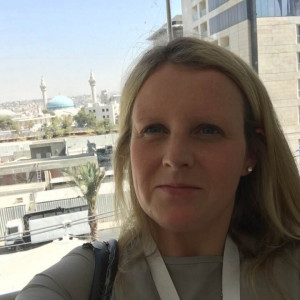How do you know when to push yourself vs rest?
Interview with Rosemary, a digital content marketing manager reveals must-see freelance tips
When working for local businesses or projects that are seasonal, during those times, I push myself to get a lot more done in that seasonal timeframe and reward myself afterward with time off and a treat.
One must have a work-life balance as it’s so important to look after your health when you are working for yourself.
Rosemary, a digital content marketing manager shares the freelance lessons she has learned over the years—see her tips & exceptional entrepreneurial wisdom.
Read full interview from Interview with Rosemary, a digital content marketing manager reveals must-see freelance tips.
Interview with Elizabeth, a graphic designer and art director
This is something I’m working on - I’m currently stuck in constant push mode. But not because I’m behind or have to push myself to keep up, but because I have so many fascinating conversations where really cool ideas are hatched that I can’t wait to bring to life.
If I see an opportunity to do or make something interesting, I’ll usually jump at the chance.
I’m currently a week away from a two-week digital detox holiday on a remote island and, don’t get me wrong, I’m rather excited but scared at the same time. Two weeks without constant data input is going to be interesting. I’ll let you know how it goes.
Elizabeth provides the ultimate list of tips for aspiring freelancers and remote workers. Check out her game-changing tools, and advice for thriving as a freelancer.
Read full interview from Interview with Elizabeth, a graphic designer and art director.
Interview with Shauna, founder and business consultant specializing in remote work
I'm not great at this I'll admit, and I've struggled with giving myself true 'rest-time.' One day a week though, I'll really try to completely shut off from work and technology, leave the phone at home and get out into nature or spend quality time with loved ones.
I've learnt over recent years the importance of slowing down and how to value myself outside of what I produce or get done.
Some of my best work has come from a result of slowing down and being well rested.
Shauna is a consultant that guides companies in thriving while remote—see her advice for staying grounded as a remote worker.
Read full interview from Interview with Shauna, founder and business consultant specializing in remote work.
Interview with Haley, a VP of Operations shares her stellar remote work strategies
When I started, I didn’t structure time in intervals to naturally let me push and recover (push: intense calls, big projects, recover: 90% of admin). Now, I try to break up my time to prevent burnout.
There are naturally times after something big is implemented when you’re managing the implementation and kind of waiting to get started on what’s next. This is naturally the time when you need rest, and when it makes sense to start doing the research/learning/prep for the next big push.
Haley has figured out the way she works best as a VP of Operations. See her principles of remote work and the unique advice a former boss gave her about breaks.
Read full interview from Interview with Haley, a VP of Operations shares her stellar remote work strategies.
Interview with Jake, a customer success manager for Atlassian
My emotions typically signal that. If I'm getting impatient or start feeling in a bad mood, I probably need a break.
Jake was burned out on the San Francisco lifestyle—see how he transitioned from working in-office to working remotely for a remote-friendly company.
Read full interview from Interview with Jake, a customer success manager for Atlassian.
Interview with Ascencia, a content marketer, and avid gig economy professional
I was never a ‘hustler.’ I never push myself too hard.
I believe that my best work comes from my best state of mind and body, and that’s not when I’m exhausted.
To keep myself recharged and inspired, for the past two years, I scheduled a 2-week to month-long vacation abroad. After the vacation/living abroad, I will be motivated to earn more money, sharpen my skills, and visit more countries.
A forgotten two-year-old Upwork account allowed Ascencia to become a content marketer—see how the gig economy has offered her an alternative path to success.
Read full interview from Interview with Ascencia, a content marketer, and avid gig economy professional.
Interview with Molood, a CEO who shares how minimalism has improved her remote work experience
That is a great question. I work with accountability vs. responsibility a lot. I feel responsible to add value and deliver as much as possible to the world, to my clients, and to everyone I care about.
However, I am only accountable for what I have promised to others. Creating a balance between accountability vs. responsibility has not been easy, but I think I have finally learned it in the last two years that I started hiring new employees into the business.
The culture that I have cultivated in Remote Forever allows everyone to express themselves fully, and therefore we all know how others are feeling, what they are going through outside of work, and we hold each other accountable as every individual operates with responsibility.
Remember, I mentioned how I heavily rely on my calendars? For me personally, the indication that I am pushing myself and I need to rest is skipping meals or skipping exercise three times in a week or more, or forgetting an event even though it is on my calendar.
When I see such signs, I know that it’s time to rest. As I am accountable to deliver something that has been promised to a client or partner, even if it’s difficult to fit it into the schedule, I would consciously make my meal times shorter in order to fulfill my promise.
But when it is time to rest, I take that quite seriously too. I simply let my team know that I’m taking time off, and they step in to make sure work continues to progress. We are all humans, and we all need to put our health first.
As CEO and Founder of Remote Forever, Molood has made a career in teaching individuals and companies how to work remotely effectively. See how embracing a minimalist lifestyle has caused her to excel.
Read full interview from Interview with Molood, a CEO who shares how minimalism has improved her remote work experience.
Interview with Maggie, a senior product manager at HubSpot
After the kids are gone to bed, I try to be pretty strict on that being my downtime. I might spend an hour or two doing some work, but after that, I use that as my rest time. I also try to make sure I get seven to eight hours of sleep.
Remote work allows Maggie to live in a small town and excel in her career. Hear about how she stays professionally connected, and her essential career advice for remote workers.
Read full interview from Interview with Maggie, a senior product manager at HubSpot.
Interview with Jenna, a freelance writer who works remotely to help manage her health
I’m still learning really, through a lot of trial and error. It’s a topic that really interests me, and I plan to explore it on my blog eventually. I’d say my main tips are:
-
Learning to not feel guilty. At first when I left my job I just did absolutely nothing for weeks. I felt like I needed to recover – it can be hard to let yourself do nothing, but it was really important for me to rest. After living with chronic illness for so long, I’ve learned to be gentle with myself and not compare myself to others. My best days productivity-wise probably look a lot like some people’s worst days. I don’t waste energy feeling guilty over that anymore, but it took a long time to get to that point.
-
Checking in. Throughout the day I check with myself to see how I’m feeling - physically, cognitively, emotionally. I’ve been doing a lot of tracking (I love using my bullet journal for this) of my symptoms and sleeping habits. That started out as something to bring to doctor’s appointments, but it’s become a way for me to figure out my limits.
-
Tracking. I keep track of things in a lot of detail. For example, with sleep, I track when I’m sleeping and how often I’m waking up and for what reason(s). I keep track of the location and severity of my pain, and also my fatigue. And I keep track of my general activities. It’s a lot, but it makes it much easier for me to identify what causes my flare-ups.
-
Pacing is also a huge thing for me. I break things down so they’re more manageable and take things slowly. Combined with checking in regularly, I can usually sense when it’s time to stop doing something for the day. And I take frequent breaks. If I keep pushing myself I risk crashing and then I’m pretty much out of commission for the rest of the day or even the rest of the week.
When I burned out, I had moments like: I forgot how to park my car; I forgot my phone number that I’ve had for a decade; I had trouble walking – scary things that definitely shouldn’t happen at my age. So I’ve learned how important it is to respect my body’s limits.
Jenna started working remotely after realizing her office job was causing health problems—now she works as a freelance writer and writes about self-improvement
Read full interview from Interview with Jenna, a freelance writer who works remotely to help manage her health.
Interview with Dani and Luca, digital nomads who have mastered work and travel
We are pretty good at making rest, fun, and work coexist. We don't feel tired as we used to when we were at home, and usually, we sleep till late in the morning so that when we work, we are more than relaxed. There might be a day that is tougher than others, but we deal with it with the least stress possible.
Dani and Luca have mastered the art of traveling while working—see their hacks & tips for thriving as digital nomads.
Read full interview from Interview with Dani and Luca, digital nomads who have mastered work and travel.








